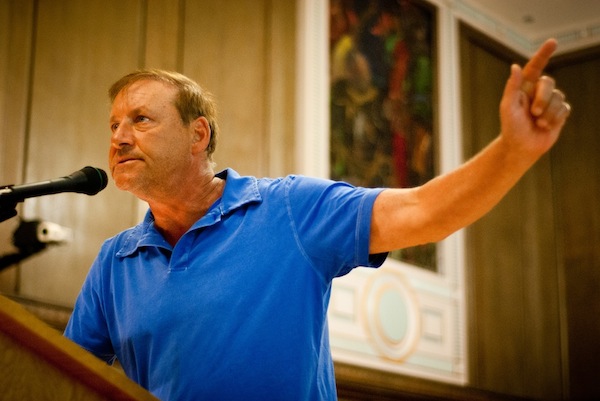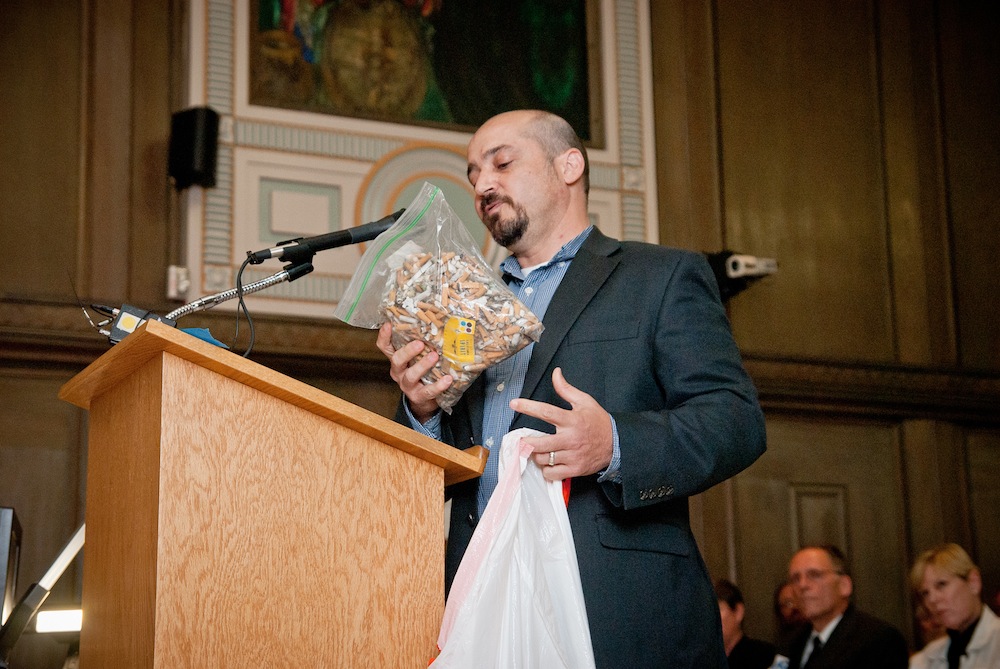Butt out: BID Advocate Joe Minicozzi, who accused opponents of “hyberbole and histrionics,” displayed bags of cigarette butts collected downtown. Photos by Max Cooper
By the time the proposal for a downtown business improvement district landed before the Asheville City Council June 12, it came with years of history and a heap of controversy.
The idea for a nonprofit funded by a special tax on downtown property was part of the Downtown Master Plan that Council adopted, in principle, in 2009. The Downtown Management Subcommittee, charged with helping implement parts of the master plan, set up an interim board for the BID that produced the proposal.
Proponents, many of them key players in downtown’s power structure, say the BID is a way to deal with things like keeping streets clean and the district prosperous. Opponents — a diverse group ranging from conservative developers to radical activists — say the BID would impose an unnecessary tax burden, give power to an unelected board and stifle downtown’s unique culture.
Both sides turned out en masse, filling the Council chamber and two overflow rooms. Proponents packed the front rows of the audience seating; on the street below, opponents banged drums and played music as the discussion began.
Business improvement districts “work to sustain what makes the city special,” interim BID board Chair Susan Griffin told Council. “It translates into increased revenue, not just for downtown merchants, but for city and county coffers as well.”
Peter Alberice laid out the specifics of the BID, saying the tax increase that would fund it — 7 cents per $100 of property value — amounts to no more than the cost of a truffle or a cup of coffee per day.
On a $1 million downtown building, the additional tax bite would be $700 per month. That’s a 16.6 percent increase over the city’s current rate (42 cents per $100).
The BID’s 13-member board would include three major property owners (those holding more than $3 million worth), two large property owners ($1.5 million to $3 million), two small owners (less than $1.5 million), two retail/restaurant owners, two residents, one office owner and one at-large member. Board members would appoint their own successors.
Alberice defended the much-criticized structure, saying, “We’ve done the best we can to ensure there’s as wide a range of people represented on this board as possible.”
Another source of controversy is the teams of downtown “ambassadors” who would assist visitors and deter “undesirable” behavior. “We do not want to form a police force,” asserted Alberice, stressing that these workers would not be armed.
Spirited debate
The sometimes dramatic debate touched on fundamental issues concerning who holds the power downtown and who contributes to its well-being.
Joe Minicozzi, an urban planner who helped write the proposal, accused many opponents of being “free riders” who hadn’t put in the volunteer hours supporters had. Throwing down gallon bags of cigarette butts in front of the lectern to make a point about the level of trash downtown, Minicozzi claimed opponents were relying on “hyperbole and histrionics.”
Local restaurant owner Dwight Butner, who serves on the Downtown Commission, invoked Martin Luther King Jr. in endorsing the BID, saying it was part of a liberal struggle for progress. “There is no rational reason not to adopt this proposal that increases the economic and cultural well-being of our downtown,” he declared.
But Libertie Valance, one of Firestorm Cafe’s worker-owners, framed the issue as “a disagreement over to whom downtown belongs,” saying proponents “see urban centers as spaces almost exclusively concerned with the generation of private profits.”
“If this is fair and democratic, who are the stakeholders being excluded?” Valance wondered. “If city planners had asked me who I thought the stakeholders in downtown were — and they never did — I would have said businesses and residents, but I would also have said workers, renters, retirees, immigrants, students, the unhoused and everyone else who contributes to and benefits from Asheville’s unique culture. Sadly, these are people that, while constituting the majority interest in downtown, have been excluded from the BID’s planning and proposed governance.”
Imke Durre, who owns downtown residential property, maintained that many more people oppose the BID than were present at the meeting. In an ad hoc group’s survey of property owners, all but seven of the more than 100 respondents rejected the idea, she said.
“This group of people would not self-impose the BID,” said Durre, urging, “Delay this decision and take into account additional pieces of information. The majority of time has been taken by those involved in the process, but consider the opinions of those who were not part of the process.”
People from rural areas feel uncomfortable coming downtown, argued north Asheville resident Monica Toych, noting that she and her husband had been approached by panhandlers while walking to the meeting. “It’s amazing to see the change in Boone with a BID. I don’t see why Asheville would oppose this.”
But downtown waiter Martin Ramsey said the BID would divide Asheville, creating “a city within a city.” He called the idea “as wrong-headed as it is anti-democratic.”
A number of hoteliers and other business owners also opposed the BID and called for its delay.

Not the time: BID opponent Chris Peterson said the proposal will hurt independent business and put too much power in the hands of an unelected board
“It’s going to be the businesses that get clobbered: You pass this tax and you’ll see chains coming here, because they’re the only ones that can afford this,” predicted local developer Chris Peterson. “We elected Council: You run the city. Don’t let someone come in and run it that hasn’t been voted in.”
“There are fundamental flaws in how this has been structured, the timing and the governance,” said Wes Reinhardt, representing the FIRC Group. “There’s going to be unintended consequences like higher rents. Taxes have to come from somewhere.” FIRC is a major downtown property owner.
After more than two hours of public debate, Council members seemed largely supportive of the idea of a BID but had enough questions that they felt a delay was needed. “Everything about our community will benefit with a stronger downtown,” asserted Council member Marc Hunt. “Enthusiastic as I am, I believe that more work is required.”
Hunt proposed postponing a vote until Sept. 25, allowing for more work on the structure of the BID contract, the nonprofit’s leadership and finances, and how much oversight the city would have.
Council member Gordon Smith wanted more diversity on the BID’s board, reminding advocates that whatever their issues with opponents, they should keep in mind that dealing with critics would be part of the organization’s job.
Council member Cecil Bothwell criticized a WCU study touting the economic growth an Asheville BID would provide, saying, “There are so many qualifications, it renders it meaningless.” He also broached the idea of holding a referendum on the BID.
“I don’t think we have a good record of non-elected boards handling taxpayer money,” Bothwell observed, citing past problems with the Pack Square Park Conservancy, the Grove Arcade Public Market Foundation and the Tourism Development Authority. “Don’t the voters deserve a say as well as the property owners?”
Council member Jan Davis, himself a downtown-business owner, said that while he wouldn’t mind paying for an effective BID, he has concerns about the current structure. “We have to be aware that what we’re doing is giving authority to a taxing entity,” Davis pointed out.
Griffin said any delay past September would be problematic, because “We have a lot of people that are billing at $200 an hour,” and because current interim board members might leave.
Council approved the delay on a 6-0 vote; Vice Mayor Esther Manheimer was absent on a family vacation.
The delay will mean that the earliest the BID could take effect would be July 2013, because the tax to support it must be approved before the start of the fiscal year.
Breaking the impasse
Council also approved the city’s 2012-13 budget on a 5-1 vote, breaking a weeks-long deadlock over staff salaries.
On May 22, police and firefighters had shown up in force to demand a 4 percent raise rather than the proposed 1 percent. Amid stark disagreements that night, a tax increase to fund the raise failed by a single vote. A special June 5 work session also failed to resolve the issue, with Council split over whether to offer a 2 or 3 percent raise and staff emphasizing that things like infrastructure and operations are also in desperate need of funds.
This time, however, Council members settled on a 2 percent raise that could turn into 3 percent in late fall if sales-tax revenues continue to improve.
“This year, for the first time, we’re hopefully beginning to see the light at the end of the tunnel,” noted Smith. “Our commitment to staff salaries is a major piece, but we all know it can’t be the only priority.”
Bothwell, who still wanted a 3 percent staff raise, cast the lone dissenting vote.
In other action, Council unanimously approved:
• A $3.5 million tax-and-infrastructure incentives package for New Belgium Brewing, which is slated to begin construction in the River Arts District in 2014.
• More than $500,000 over five years for 176 units of affordable and work-force housing on Glenn Bridge Road in South Asheville.




Doesn’t a $.07 rate increase translate to $700 a year per million rather than $700 a month?